中央电大2013年7月高级英语(2)试题
- 格式:pdf
- 大小:1.35 MB
- 文档页数:12
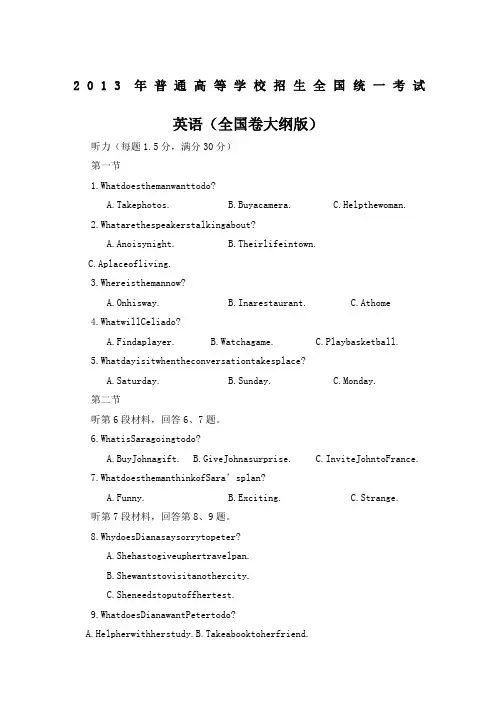
2013年普通高等学校招生全国统一考试英语(全国卷大纲版)听力(每题1.5分,满分30分)第一节1.Whatdoesthemanwanttodo?A.Takephotos.B.Buyacamera.C.Helpthewoman.2.Whatarethespeakerstalkingabout?A.Anoisynight.B.Theirlifeintown.C.Aplaceofliving.3.Whereisthemannow?A.Onhisway.B.Inarestaurant.C.Athome4.WhatwillCeliado?A.Findaplayer.B.Watchagame.C.Playbasketball.5.Whatdayisitwhentheconversationtakesplace?A.Saturday.B.Sunday.C.Monday.第二节听第6段材料,回答6、7题。
6.WhatisSaragoingtodo?A.BuyJohnagift.B.GiveJohnasurprise.C.InviteJohntoFrance.7.WhatdoesthemanthinkofSara’splan?A.Funny.B.Exciting.C.Strange.听第7段材料,回答第8、9题。
8.WhydoesDianasaysorrytopeter?A.Shehastogiveuphertravelpan.B.Shewantstovisitanothercity.C.Sheneedstoputoffhertest.9.WhatdoesDianawantPetertodo?A.Helpherwithherstudy.B.Takeabooktoherfriend.C.Teachageographylesson.听第8段材料,回答第10至12题。
10.Whydoesthemancallthewoman?A.Totellherabouthernewjob.B.Toaskaboutherjobprogram.C.Toplanameetingwithher.11.Whoneedsanewflat?A.Alex.B.Andrea.C.Miranda.12.Whereisthewomannow?A.InBaltimore.B.InNew York.C.InAvon.听第9段材料,回答第13至16题。
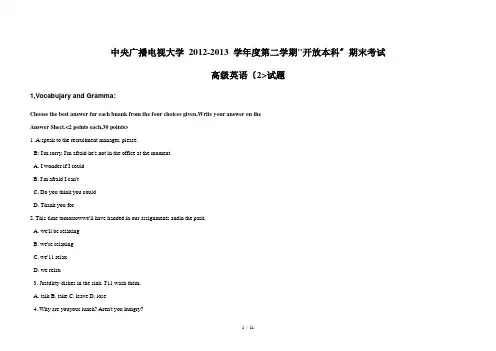
中央广播电视大学2012-2013 学年度第二学期"开放本科〞期末考试高级英语〔2>试题1,Vocabujary and Gramma:Choose the best answer fur each bnank from the four choices given.Write your answer on theAnswer Shect.<2 points each,30 points>1 .A:speak to the recruitment manager, please.B: I'm sorry, I'm afraid he's not in the office at the momentA. I wonder if I couldB. I'm afraid I can'tC. Do you think you couldD. Thank you for2. This time tomorrowwe'll have handed in our assignments andin the park.A. we'll be relaxingB. we're relaxingC. we'11 relaxD. we relax3. Justdirty dishes in the sink. I'11 wash them.A. talkB. takeC. leaveD. lose4. Why are youyour lunch? Aren't you hungry?A. pigging outB. parting withC. picking atD. pointing out5. After theydinner, they went out.A. finishB. are finishingC. have finishedD. had finished6. A:I really should go home now, or myname'll be mud. B:A: oh, I mean I'll be very u flpopu1ar-I'm late!A. What I meant wasB. Are you with me?C. I am listening.D. Sorry,I'm not with you.7. I'm glad I saw that film, it reallyA. cheered upB. cheered me upC. cheered up meD. me cheered up8admit that most people are not interested in being informed.A. You decide toB. You have toC. The other hand toD. As far as I9it, it's all about money-it'spure greed.A. The way I seeB.You have to sayC. Talk aboutD. As far as I see1o. If Tonyme a lift on his bike, I always say'noA.offer B. would offer C. offered D. offers11. I sometimes feel as if Toby 'Sn't even aware of myA. existB. existenceC. existingD.existed12. Do we really have to fill in all these forms? It's soA. simpleB. appealingC. modernD. tiresome13. You look a bit_.Maybe you should take some extra vitamins.A. worriedB. run-downC. confidentD. outraged14. Once the press find out his secret,he'11 never live itA.upB.onC. downD. off15. There aremistakes in this TV guide:I've found one on every page so far.A. quite a fewB. not too manyC. almost noD. very fewII .Reading comprehensionPassage OneRead the article and then match 16-20 to A-E. Write your answer on the Answer Sheet.<4 points each,20 points>Do you realise that your body language is telling people a whole range of things that you may not be conscious of? In this introduction to her series on nonverbal communication, Rebecca Cripps gives us some tips for interpreting and using the unspoken code.16 . We lean towards people we find attractive and interesting and away from those we don't,It's that simple!17 Holding your palms slightly up and outwards is seen as open and friendly. Gestures with the palms down are generally seen as dominant and possibly aggressive. Thispalm up,palm down distinction is very important when it comes to shaking hands and we suggest you always offer a handshake upright and vertical,to convey equality.18Stand too close and you'11 be seen as pushy. Stand too far away and you’ll appear unfriendly. Neither are what we want,so observe in a group Situation how close the other people are to each other. If you move closer to someone and they back away,you've probably overstepped the mark and are just a bit too much in their personal space.19even though most people can'tmove them much,if at all. However, you'vegot two ears and only one mouth,so try to use them in that order, If you listen twice as much as you talk,you come across as a good communicator who knows how to strike up a balanced conversation without being"me me me"or the wallflower.20 We purse our lips and sometimes twist them to the side when we're thinking.We might also use this movement to hold hack an angry comment. Then of course we smile: people smile for all sorts of reasons, only one of which is to signal happiness. But more of that next week.A. Mouth movements can give away all sorts of cluesB. Hand gestures are so numerous it's hard to give a brief guide but here goesC. Distance from others is crucial if you want to give the right signalsD. Angle of the body in relation to others gives an indication of our attitude towardsthemE. Ears play a vital role in communication with othersPassage TwoRead the article and then judge the statements are true 《T>,false《F>or not informed<NI>. Write your answer on the Answer Sheet<2 points each,10 points>.Amazing PeopleIn this week's edition of Amazing People,we have decided to include some lesswell-known celebrities. They may not be world famous or household names,but as we oftensay,there's more than one way to be special!Disabled sailor crosses ChannelOn August 23rd 2005,a British woman who can only move her head,eyes and mouth,sailed across the English Channel and into the record books. Completing her journey in justover six hours,Hilary Lister set a record for the world's longest solo sail by a disabledperson. Using only her breathing to navigate her boat,she reached Calais to a hero'5welcome. Having arrived in France,MrsLister said,'I'm just thrilled',and attributed hersuccess to the people who'd helped her. When she made her crossing,she'd been paralysedfor four years. And she'd been sailing for only two. Having lived an active life before herillness,she took up sailing to boost her confidence.Lightning never strikes twice?Roy Sullivan,a forest ranger from Virginia,was struck by lightning seven times in hisThirty-six-year career. The first strike was in 1942. He wasn't hit again until twenty-sevenyears later,driving his truck. The following year, another bolt of lightning burnt hisshoulder, while his hair caught fire in a fourth strike in 1972. A year later,Sullivan wasdriving around the park when a bolt came out of a small cloud,knocking off his shoe.'l actually saw the lightning coming straight for me,'he said. Lightning struck for the sixth time in 1976. But it was the final strike in 1977,while he was fishing,that put him in the Guinness Book of World Records. Two of his Ranger hats,burnt by lightning,are now in Guinness Exhibit Halls-proof that lightning does strike in the same place twice.Child prodigyWolfgang Amadeus Mozart showed musical gifts at a very early age, and was already composing his first works when he was four. Born in Salzburg in 1756,he was one of the greatest musical geniuses in history. By the age of six, he'd played before the Austrian empress and had begun to write his earliest symphonies. A year later,he was playing to audiences in London and Paris, astonishing them with his brilliance. He worked all over Europe during the next seventeen years,finally settling in Vienna. He lived just a little over half of Beethoven's life span but was amazingly prolific. He died in 1791,aged onlythirty-five,having composed over 600 works,including great operas like The Magic Flute. Just before his death,he'd been composing the Requiem,one of his most famous works.21.Hilary Lister was the first disabled woman to sail from England to France.22.Hiary Lister had never done any sailing until two years before the crossing.23. Lightning struck Roy Sullivan for the third time in 1970.24. By 1973,Roy Sullivan had survived five lightning strikes.25. Mozart wrote his earliest symphonies when he was four.lll .ClozeChoose the correct word to fill in the blank. Each word must be used once and only once. Write your answer on the Answer Sheet.<2 pints each,10 points>In December 1915,LakeMorena was nearly empty and everybody in San Diego waspraying for rain. In desperation,the city council 26 Charles Hatfield,the Rainmaker.Hatfield27to fill the lake for$10,000. On January 1 1916,he started work,28his secret rain-making chemicals. By January 5,the rain had started. By January 20 it hadbeen raining non-stop for two weeks. On January 26 the level of the lake29 by two feetper hour when suddenly it stopped-just five inches from the top. Having kept his promiseHatfield wanted his money. But the city council 30 to pay,saying that the rain wsa anact of God'.Hatfield had only made a verbal agreement,and hadn'tsigned a contract. Henever received a penny.A. was risingB. usingC. contactedD. refusedE. agreedⅣ .Writing3l.Write your essay on the Answer Sheet in 200-250 words.<30 points>An English person recently came to your school to give a talk<what was the talkabout?>.He/She left a personal possession<what is it?>at the school <where exactly?>.You want to return the possession<how will you return it?>but you have had difficultycontacting the person <howhave you tried to contact him/her?>.You have a possible addressfor the person,hut you're not sure if it's correct <why?>.Write a letter to the person..Thank them for coming to give the talk.. Explain the situation..Ask them to contact you.高级英语〔2>试题答案与评分标准〔供参考〕I .Vocabulary and Grammar< 2 points each,30 points>1.A2. A3. C4. C5. D6.D7. B8. B9. A 10. D11. B 12. D 13. B 14. C 15.AII .Reading comprehension<30 points>Passage One<4 points each,20 points in total>16. D 17. B 18.C 19. E 20. APassage Two< 2 points each,10 points in total>21 .NI 22. T 23. T 24.T 25. FIII .Cloze <2 points each,10 points in total>26. C 27. E 28. B 29.A 30. DIv .Writing<30 points>Dear Mr Collins,I am writing to thank you for attending our school careers day last week and giving such an inspirational and interesting speech on career prospects in the financial services industry.I am also writing to inform you that you left a CD-ROM in the computer which you used during your speech. Iwould like to return it to you as soon as possible but Iwas unsure whether to send it to your company or adifferent address.I contacted your office but,unfortunately,you were away on business and I spoke to a secretary. She said that the disc belonged to your own private consultancy business and that I should send it there. She provided me with an address but I am afraid that I may have written it down incorrectly. The address I have is as follows:Collins'Consultancies, Box283 A,Bristol. Could you please confirm that this is the correct address to which I should send the disc?Thank you once again for your generosity in giving up your valuable time for the students at our school and lam sorry I have been unable to return your CD-ROM more promptly.Yours sincerely,John Smith.John SmithStudent Committee Chairperson11 / 11。
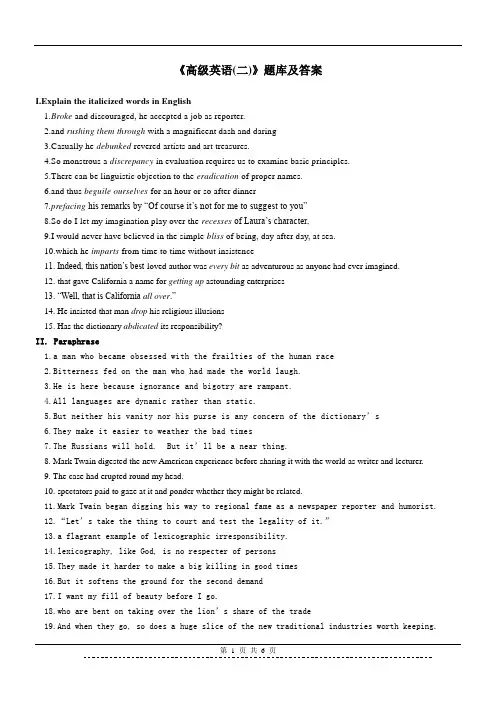
《高级英语(二)》题库及答案I.Explain the italicized words in English1.Broke and discouraged, he accepted a job as reporter.2.and rushing them through with a magnificent dash and daring3.Casually he debunked revered artists and art treasures.4.So monstrous a discrepancy in evaluation requires us to examine basic principles.5.There can be linguistic objection to the eradication of proper names.6.and thus beguile ourselves for an hour or so after dinner7.prefacing his remarks by “Of course it’s not for me to suggest to you”8.So do I let my imagination play over the recesses of Laura’s character,9.I would never have believed in the simple bliss of being, day after day, at sea.10.which he imparts from time to time without insistence11. Indeed, this nation’s best-loved author was every bit as adventurous as anyone had ever imagined.12. that gave California a name for getting up astounding enterprises13. “Well, that is California all over.”14. He insisted that man drop his religious illusions15. Has the dictionary abdicated its responsibility?II. Paraphrase1.a man who became obsessed with the frailties of the human race2.Bitterness fed on the man who had made the world laugh.3.He is here because ignorance and bigotry are rampant.4.All languages are dynamic rather than static.5.But neither his vanity nor his purse is any concern of the dictionary’s6.They make it easier to weather the bad times7.The Russians will hold. But it’ll be a near thing.8. Mark Twain digested the new American experience before sharing it with the world as writer and lecturer.9. The case had erupted round my head.10. spectators paid to gaze at it and ponder whether they might be related.11.Mark Twain began digging his way to regional fame as a newspaper reporter and humorist.12.“Let’s take the thing to court and test the legality of it.”13.a flagrant example of lexicographic irresponsibility.14.lexicography, like God, is no respecter of persons15.They made it harder to make a big killing in good times16.But it softens the ground for the second demand17.I want my fill of beauty before I go.18.who are bent on taking over the lion’s share of the trade19.And when they go, so does a huge slice of the new traditional industries worth keeping.20.Pug saw no point of equivocating.21.there is a touch of rough poetry about himIII. Translate the following into Chinese1.From them all Mark Twain gained a keen perception of the human race, of the difference between what people claim to be and what they really are.2.What underlies a ll this sound and fury? Is the claim of the G&C Merriam Company, probably the world’s greatest dictionary maker, that it required the efforts of three hundreds scholars over a period of twenty-seven years, working on the largest collection of citations ever assembled in any language ---is all this a fraud, a hoax?3. Mark Twain suggested that an ingredient was missing in the American ambition when he said: “ What a robust people, what a nation of thinkers we might be, if we would only lay ourselves on the shelf occasionally and renew our edges.”4. But, today, this vital British industry is more in peril than ever before. On almost all the major sea routes of the world, the British fleet risks being elbowed out by stiff foreign competition.5.“……they vanish from a world where they were of no consequence; where they achieved nothing; where they werea mistake and a failure and foolishness; where they have left no sign that they had existed--- a world which will lament them a day and forget them forever.”6.Smaller shipping lines do not have the resources to diversify. They face extinction. And when they go, so does a huge slice of the few traditional industries worth keeping.7.Darrow walked slowly round the baking court. “Today it is the teachers,” he continued, “and tomorrow the magazines, the books, the newspapers. After a while, it is the setting of man against man and creed against creed until we are marching backwards to the glorious age of the sixteenth century when bigots lighted faggots to burn the man who dared to bring any intelligence and enlightenment and culture to the human mind.”8.What I like best are the stern cliffs, with ranges of mountains soaring behind them, full of possibilities, peaks to be scaled only by the most daring. What plants of the high altitudes grow unravished among their crags and valleys? So do I let my imagination play over the recesses of Laura’s character, so austere in the foreground but nurturing what treasures of tenderness, like delicate flowers, for the discovery of the venturesome.IV. Translate the following into English1.汤姆的聪明丝毫不亚于班上的第一名学生。
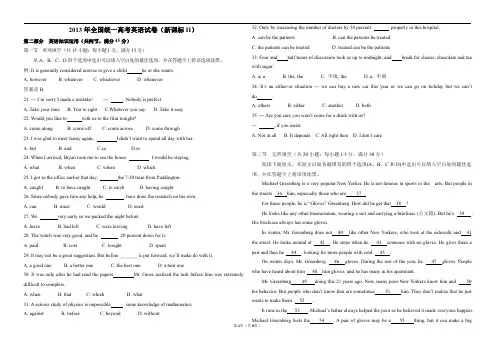
2013年全国统一高考英语试卷(新课标II)第二部分英语知识运用(共两节,满分45分)第一节单项填空(共15小题:每小题1分,满分15分)从A、B、C、D四个选项中选出可以填入空白处的最佳选项,并在答题卡上将该选项涂黑。
例:It is generally considered unwise to give a child he or she wants.A.howeverB.whateverC.whicheverD.whenever答案是B.21.---I’m sorry I made a mistake!---.Nobody is perfect.A.Take your timeB.You’re rightC.Whatever you sayD.Take it easy22.Would you like to with us to the film tonight?e alonge offe acrosse through23.I was glad to meet Jenny again,I didn’t want to spend all day with her.A.butB.andC.soD.or24.When I arrived,Bryan took me to see the house I would be staying.A.whatB.whenC.whereD.which25.I got to the office earlier that day,the7:30train from Paddington.A.caughlB.to have caughtC.to catchD.having caught26.Since nobody gave him any help,he have done the research on his own.A.canB.mustC.wouldD.need27.We very early so we packed the night before.A.leaveB.had leftC.were leavingD.have left28.The watch was very good,and he20percent down for it.A.paidB.costC.boughtD.spent29.It may not be a great suggestion.But before_______is put forward,we’ll make do with it.A.a good oneB.a better oneC.the best oneD.a best one30.It was only after he had read the papers Mr.Gross realized the task before him was extremely difficult to complete.A.whenB.thatC.whichD.what31.A serious study of physics is impossible some knowledge of mathematics.A.againstB.beforeC.beyondD.without 32.Only by increasing the number of doctors by50percent properly in this hospital.A.can be the patientsB.can the patients be treatedC.the patients can be treatedD.treated can be the patients33.Four and half hours of discussion took us up to midnight,and break for cheese,chocolate and tea with sugar.A.a;aB.the;theC.不填;theD.a;不填34.It’s an either-or situation---we can buy a new car this year or we can go on holiday but we can’t do.A.othersB.eitherC.anotherD.both35.---Are you sure you won’t come for a drink with us?---,if you insist.A.Not at allB.It dependsC.All right thenD.I don’t care第二节完形填空(共20小题;每小题1.5分,满分30分)阅读下面短文,从短文后面各题锁哥的四个选项(A、B、C和D)中选出可以填入空白处的最佳选项,并在答题卡上将该项涂黑。
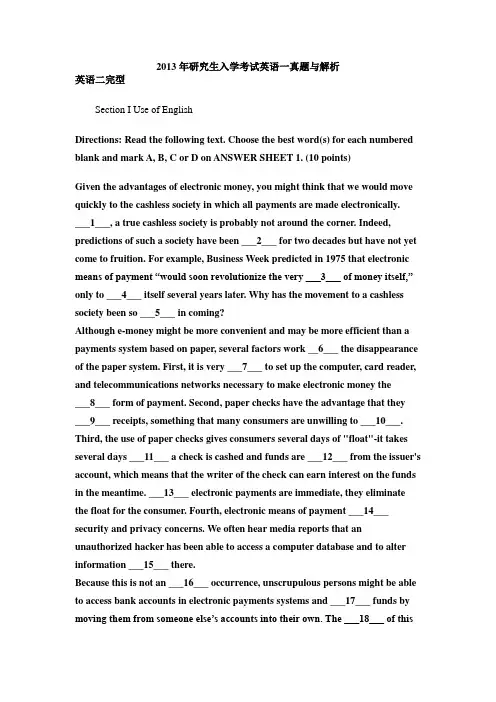
2013年研究生入学考试英语一真题与解析英语二完型Section I Use of EnglishDirections: Read the following text. Choose the best word(s) for each numbered blank and mark A, B, C or D on ANSWER SHEET 1. (10 points)Given the advantages of electronic money, you might think that we would move quickly to the cashless society in which all payments are made electronically.___1___, a true cashless society is probably not around the corner. Indeed, predictions of such a society have been ___2___ for two decades but have not yet come to fruition. For example, Business Week predicted in 1975 that electronic means of payment “would soon revolutionize the very ___3___ of money itself,” only to ___4___ itself several years later. Why has the movement to a cashless society been so ___5___ in coming?Although e-money might be more convenient and may be more efficient than a payments system based on paper, several factors work __6___ the disappearance of the paper system. First, it is very ___7___ to set up the computer, card reader, and telecommunications networks necessary to make electronic money the___8___ form of payment. Second, paper checks have the advantage that they___9___ receipts, something that many consumers are unwilling to ___10___. Third, the use of paper checks gives consumers several days of "float"-it takes several days ___11___ a check is cashed and funds are ___12___ from the issuer's account, which means that the writer of the check can earn interest on the funds in the meantime. ___13___ electronic payments are immediate, they eliminate the float for the consumer. Fourth, electronic means of payment ___14___ security and privacy concerns. We often hear media reports that an unauthorized hacker has been able to access a computer database and to alter information ___15___ there.Because this is not an ___16___ occurrence, unscrupulous persons might be able to access bank accounts in electronic payments systems and ___17___ funds by moving them from someone else’s accounts into their own. The ___18___ of thistype of fraud is no easy task, and a whole new field of computer science has developed to ___19___ security issues. A further concern is that the use of electronic means of payment leaves an electronic ___20___ that contains a large amount of personal data on buying habits. There are worries that government, employers, and marketers might be able to access these data, thereby encroaching on our privacy.1. [A] However [B] Moreover [C] Therefore [D] Otherwise2. [A] off [B] back [C] over [D] around3. [A] power [B] concept [C] history [D] role4. [A] reward [B] resist [C] resume [D] reverse5. [A] silent [B] sudden [C] slow [D] steady6. [A] for [B] against [C]with [D] on7. [A] imaginative [B] expensive [C] sensitive [D] productive8. [A] similar [B] original [C] temporary [D] dominant9. [A] collect [B] provide [C] copy [D] print10. [A] give up [B] take over [C] bring back [D] pass down11. [A] before [B] after [C] since [D] when12. [A] kept [B] borrowed [C] released [D] withdrawn13. [A] Unless [B] Until [C] Because [D] Though14. [A] hide [B] express [C] raise [D]ease15. [A] analyzed [B] shared [C] stored [D] displayed16. [A] unsafe [B] unnatural [C] uncommon [D] unclear17. [A] steal [B] choose [C] benefit [D] return18. [A] consideration [B] prevention [C] manipulation [D] justification19. [A] cope with [B] fight against [C] adapt to [D] call for20. [A] chunk [B] chip [C] path [D] trail答案:1-5: ADBDC6-10: BBDBA11-15: ADCCC16-20: CABAD英语二阅读原文及出处:Text 1In an essay, entitled “Making It in America,”in the latest issue of The Atlantic, the author Adam Davidson relates a joke from cotton country about just how much a modern textile mill has been automated: The average mill has only two employees today, “a man and a dog. The man is there to feed the dog, and the dog is there to keep the man away from the machines。
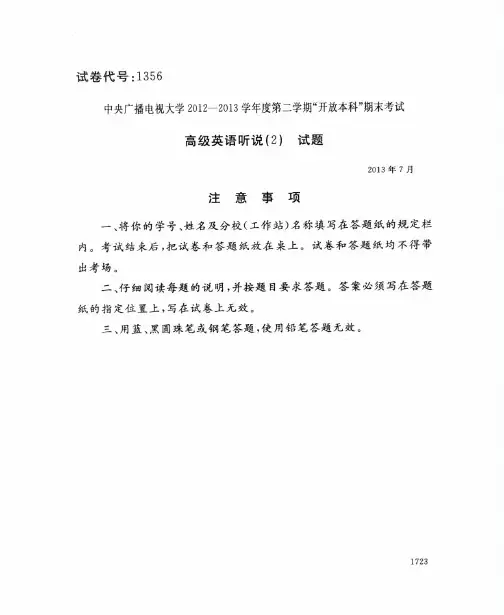
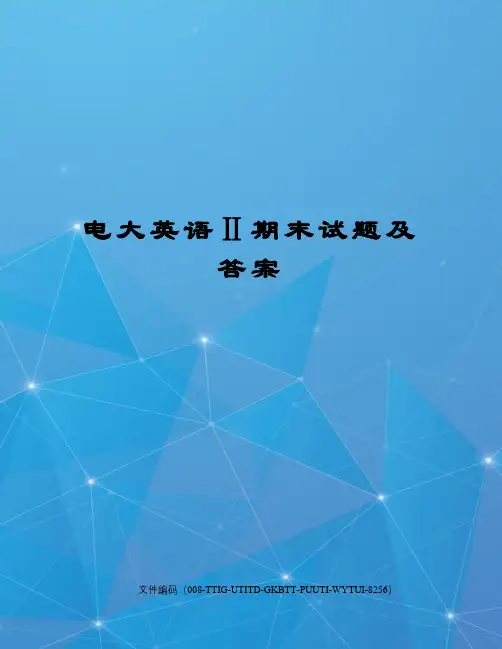
电大英语Ⅱ期末试题及答案文件编码(008-TTIG-UTITD-GKBTT-PUUTI-WYTUI-8256)试卷代号:1162中央广播电视大学2012-2013学年度第二学期“开放本科”期末考试英语Ⅱ(2)试题注意事项一、将你的学号、姓名及分校(工作站)名称填写在答题纸的规定栏内。
考试结束后,把试卷和答题纸放在桌上。
试卷和答题纸均不得带出考场。
一、仔细阅读每题的说明,并按题目要求答题。
答案必须写在答题纸指定的位置上,写在试卷上无效。
三、用蓝、黑圆珠笔或钢笔答题,使用铅笔答题无效。
第一部分交际用语1-5小题:阅读下面的小对话,从A\\D四个选项中选出一个能填入空白处的最佳选项。
并在答题纸上写出所选的字母符号。
(共计10分,每小题2分)___。
.。
________。
___一.'tbelieveit,ithasn',itis2.-Wouldyoulikeatea_-_-.-.。
________。
_一.,,,Idon'tmind___.。
________。
.。
一.Tokyo一.,Ididn',butIhopetogotherenextyear'lldoitnexttime.__________-..___.._一.'''sallright第二部分词汇与语法结构6-15小题:阅读下面的句子,从A\B\C\D四个选项中选出一个能填入空白处的最佳选项,并在答题纸上写出所选的字母符号。
(共计20分,每小题2分)..togetC.getsD.got.''''''into'-No,youcanfinishitlater.China第三部分完形填空处的最佳选项-并在答题纸上圈出所选的字母符号。
(共计20分,每小题2分】2PattenCloseDerbyDJ56XX16April2003DearSirorMadam,Iamwriting(16)aboutarecentstayatyourhotel,arrivedon21'tMarchandstayedfortwonights. Firstlywewaitedtwentyminutesatreceptionbecausetherewasnobody(17)thebooking.(18),ourluggagewasleftunattendedinreceptionforthreehoursuntilwe finallytookittoourroomourselves.anotherhour(19),ithadtwosinglebedsandwe(20)adoublebed,wasonthetopfloorandtheliftwas(21).Andalthoughwehadaskedforaroomwitha seaview,itwasfacingtheroad. Althoughthefoodintherestaurantwasquitegood,wewereunhappywiththe(22)(23),thewaiterswererudeand(24).However,themanagerdidagreethatwecouldpaythewinebillinthemorning. TosumuplwasmostdissatisfiedwiththeentireexperienceandIexpectfull compensationfortheinconveniencecaused.1100kforward(25)fromyou.Yoursfaithfully,ArthurMullard第四部分阅读理解一个正确答案,并在答题纸上写出所选的字母符号。
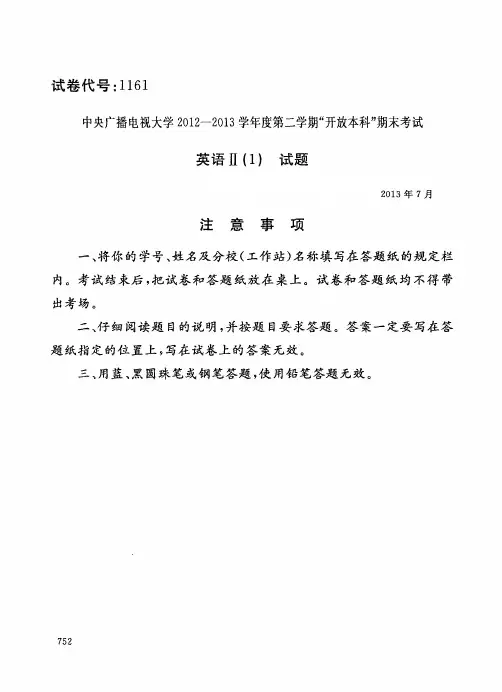
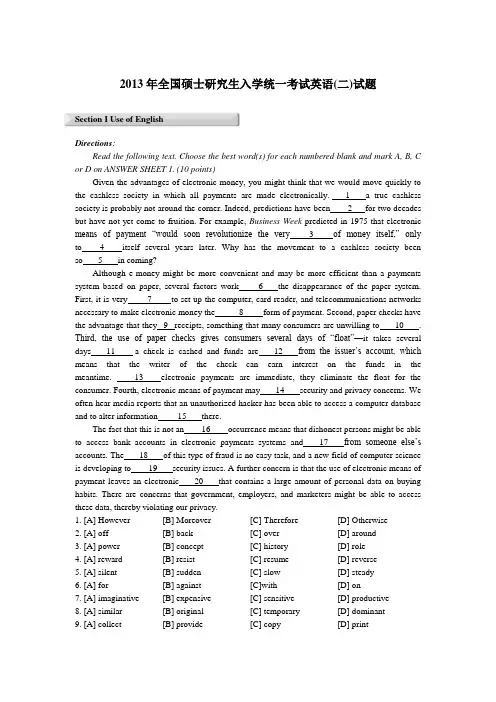
2013年全国硕士研究生入学统一考试英语(二)试题Section I Use of EnglishDirections:Read the following text. Choose the best word(s) for each numbered blank and mark A, B, C or D on ANSWER SHEET 1. (10 points)Given the advantages of electronic money, you might think that we would move quickly to the cashless society in which all payments are made electronically. 1 a true cashless society is probably not around the corner. Indeed, predictions have been 2 for two decades but have not yet come to fruition. For example, Business Week predicted in 1975 that electronic means of payment “would soon revolutionize the very 3 of money itself,” only to 4 itself several years later. Why has the movement to a cashless society been so 5 in coming?Although e-money might be more convenient and may be more efficient than a payments system based on paper, several factors work 6 the disappearance of the paper system. First, it is very 7 to set up the computer, card reader, and telecommunications networks necessary to make electronic money the 8 form of payment. Second, paper checks have the advantage that they 9 receipts, something that many consumers are unwilling to 10 . Third, the use of paper checks gives consumers several days of “float”—it takes several days 11 a check is cashed and funds are 12 from the issuer’s account, which means that the writer of the check can earn interest on the funds in the meantime. 13 electronic payments are immediate, they eliminate the float for the consumer. Fourth, electronic means of payment may 14 security and privacy concerns. We often hear media reports that an unauthorized hacker has been able to access a computer database and to alter information 15 there.The fact that this is not an 16 occurrence means that dishonest persons might be able to access bank accounts in electronic payments systems and 17 from someone else’s accounts. The 18 of this type of fraud is no easy task, and a new field of computer science is developing to 19 security issues. A further concern is that the use of electronic means of payment leaves an electronic 20 that contains a large amount of personal data on buying habits. There are concerns that government, employers, and marketers might be able to access these data, thereby violating our privacy.1. [A] However [B] Moreover [C] Therefore [D] Otherwise2. [A] off [B] back [C] over [D] around3. [A] power [B] concept [C] history [D] role4. [A] reward [B] resist [C] resume [D] reverse5. [A] silent [B] sudden [C] slow [D] steady6. [A] for [B] against [C]with [D] on7. [A] imaginative [B] expensive [C] sensitive [D] productive8. [A] similar [B] original [C] temporary [D] dominant9. [A] collect [B] provide [C] copy [D] print10. [A] give up [B] take over [C] bring back [D] pass down11. [A] before [B] after [C] since [D] when12. [A] kept [B] borrowed [C] released [D] withdrawn13. [A] Unless [B] Until [C] Because [D] Though14. [A] hide [B] express [C] raise [D]ease15. [A] analyzed [B] shared [C] stored [D] displayed16. [A] unsafe [B] unnatural [C] uncommon [D] unclear17. [A] steal [B] choose [C] benefit [D] return18. [A] consideration [B] prevention [C] manipulation [D] justification19. [A] cope with [B] fight against [C] adapt to [D] call for20. [A] chunk [B] chip [C] path [D] trailSection II Reading ComprehensionPart ADirections:Read the following four texts. Answer the questions below each text by choosing A, B, C or D. Mark your answers on ANSWER SHEET 1. (40 points)Text 1In an essay entitled “Making It in America”, the author Adam Davidson relates a joke from cotton country about just how much a modern textile mill has been automated: The average mill has only two employees today, “a man and a dog. The man is there to feed the dog, and the dog is there to keep the man away from the machi nes.”Davidson’s article is one of a number of pieces that have recently appeared making the point that the reason we have such stubbornly high unemployment and declining middle-class incomes today is also because of the advances in both globalization and the information technology revolution, which are more rapidly than ever replacing labor with machines or foreign workers.In the past, workers with average skills, doing an average job, could earn an average lifestyle. But, today, average is officially over. Being average just won’t earn you what it used to. It can’t when so many more employers have so much more access to so much more above average cheap foreign labor, cheap robotics, cheap software, cheap automation and cheap genius. Therefore, everyone needs to find their extra—their unique value contribution that makes them stand out in whatever is their field of employment.Yes, new technology has been eating jobs forever, and always will. But there’s been an acceleration. As Davidson notes, In the 10 years ending in 2009, [U. S.] factories shed workers so fast that they erased almost all the gains of the previous 70 years; roughly one out of every three manufacturing jobs—about 6 million in total —disappeared.”There will always be change—new jobs, new products, new services. But the one thing we know for sure is that with each advance in globalization and the I. T. revolution, the best jobs will require workers to have more and better education to make themselves above average.In a world where average is officially over, there are many things we need to do to support employment, but nothing would be more important than passing some kind of G. I. Bill for the 21st century that ensures that every American has access to post-high school education.21. The joke in Paragraph 1 is used to illustrate____.[A] the impact of technological advances[B] the alleviation of job pressure[C] the shrinkage of textile mills[D] the decline of middle-class incomes22. According to Paragraph 3, to be a successful employee, one has to____.[A] work on cheap software[B] ask for a moderate salary[C] adopt an average lifestyle[D] contribute something unique23. The quotation in Paragraph 4 explains that ____.[A] gains of technology have been erased[B] job opportunities are disappearing at a high speed[C] factories are making much less money than before[D] new jobs and services have been offered24. According to the author, to reduce unemployment, the most important is____.[A] to accelerate the I. T. revolution[B] to ensure more education for people[C] to advance economic globalization[D] to pass more bills in the 21st century25. Which of the following would be the most appropriate title for the text?[A] New Law Takes Effect[B] Technology Goes Cheap[C] Average Is Over[D] Recession Is BadText 2A century ago, the immigrants from across the Atlantic included settlers and sojourners. Along with the many folks looking to make a permanent home in the United States came those who had no intention to stay, and who would make some money and go home. Between 1908 and 1915, about 7 million people arrived while about 2 million departed. About a quarter of all Italian immigrants, for example, eventually returned to Italy for good. They even had an affectionate nickname, “uccelli di passaggio,” birds of passage.Today, we are much more rigid about immigrants. We divide newcomers into two categories: legal or illegal, good or bad. We hail them as Americans in the making, or brand them as aliens fit for deportation. That framework has contributed mightily to our broken immigration system and the long political paralysis over how to fix it. We don’t need mo re categories, but we need to change the way we think about categories. We need to look beyond strict definitions of legal and illegal. To start, we can recognize the new birds of passage, those living and thriving in the gray areas. We might then begin to solve our immigration challenges.Crop pickers, violinists, construction workers, entrepreneurs, engineers, home health-care aides and physicists are among today’s birds of passage. They are energetic participants in a global economy driven by the flow of work, money and ideas. They prefer to come and go as opportunity calls them. They can manage to have a job in one place and a family in another.With or without permission, they straddle laws, jurisdictions and identities with ease. We need them to imagine the United States as a place where they can be productive for a while without committing themselves to staying forever. We need them to feel that home can be both here and there and that they can belong to two nations honorably.Accommodating this new world of people in motion will require new attitudes on both sides of the immigration battle. Looking beyond the culture war logic of right or wrong means opening up the middle ground and understanding that managing immigration today requires multiple paths and multiple outcomes, including some that are not easy to accomplish legally in the existing system.26. “Birds of passage” refers to those who____.[A] immigrate across the Atlantic[B] leave their home countries for good[C] stay in a foreign country temporarily[D] find permanent jobs overseas27. It is implied in paragraph 2 that the current immigration system in the U. S. ____.[A] needs new immigrant categories[B] has loosened control over immigrants[C] should be adapted to meet challenges[D] has been fixed via political means28. According to the author, today’s birds of passage wan t____.[A] financial incentives[B] a global recognition[C] opportunities to get regular jobs[D] the freedom to stay and leave29. The author suggests that the birds of passage today should be treated ____.[A] as faithful partners[B] with economic favors[C] with legal tolerance[D] as mighty rivals30. Which is the best title for the passage?[A] Come and Go: Big Mistake.[B] Living and Thriving: Great Risk.[C] With or Without: Great Risk.[D] Legal or Illegal: Big mistake.Text 3Scientists have found that although we are prone to snap overreactions, if we take a moment and think about how we are likely to react, we can reduce or even eliminate the negative effects of our quick, hard-wired responses.Snap decisions can be important defense mechanisms; if we are judging whether someone is dangerous, our brains and bodies are hard-wired to react very quickly, within milliseconds. But we need more time to assess other factors. To accurately tell whether someone is sociable, studies show, we need at least a minute, preferably five. It takes a while to judge complex aspects of personality, like neuroticism or open-mindedness.But snap decisions in reaction to rapid stimuli aren’t exclusive to the interpersonal realm. Psychologists at the University of Toronto found that viewing a fast-food logo for just a few milliseconds primes us to read 20 percent faster, even though reading has little to do with eating. We unconsciously associate fast food with speed and impatience and carry those impulses into whatever else we’re doing. Subjects exposed to fast-food flashes also tend to think a musical piece lasts too long.Yet we can reverse such influences. If we know we will overreact to consumer products or housing options when we see a happy face (one reason good sales representatives and real estate agents are always smiling), we can take a moment before buying. If we know female job screeners are more likely to reject attractive female applicants, we can help screeners understand their biases—or hire outside screeners.John Gottman, the marriage expert, explains that we quickly “thin slice” information reliably only after we ground such snap reactions in “thick sliced” long-term study. When Dr. Gottman really wants to assess whether a couple will stay together, he invites them to his island retreat for a much longer evaluation: two days, not two seconds.Our ability to mute our hard-wired reactions by pausing is what differentiates us from animals: dogs can think about the future only intermittently or for a few minutes. But historically we have spent about 12 percent of our days contemplating the longer term. Although technology might change the way we react, it hasn’t changed our nature. We still have the imaginative capacity to rise above temptation and reverse the high-speed trend.31. The time needed in making decisions may____.[A] vary according to the urgency of the situation[B] prove the complexity of our brain reaction[C] depend on the importance of the assessment[D] predetermine the accuracy of our judgment32. Our reaction to a fast-food logo shows that snap decisions____.[A] can be associative[B] are not unconscious[C] can be dangerous[D] are not impulsive33. To reverse the negative influences of snap decisions, we should____.[A] trust our first impression[B] do as people usually do[C] think before we act[D] ask for expert advice34. John Gottman says that reliable snap reactions are based on____.[A] critical assessment[B] “thin sliced” study[C] sensible explanation[D] adequate information35. The author’s attitude toward reversing the high-speed trend is____.[A] tolerant[B] uncertain[C] optimistic[D] doubtfulText 4Europe is not a gender-equality heaven. In particular, the corporate workplace will never be completely family-friendly until women are part of senior management decisions, and Europe’s top corporate-governance positions remain overwhelmingly male. Indeed, women hold only 14 percent of positions on Europe corporate boards.The Europe Union is now considering legislation to compel corporate boards to maintain a certain proportion of women — up to 60 percent. This proposed mandate was born of frustration. Last year, Europe Commission Vice President Viviane Reding issued a call to voluntary action. Reding invited corporations to sign up for gender balance goals of 40 percent female board membership. But her appeal was considered a failure: only 24 companies took it up.Do we need quotas to ensure that women can continue to climb the corporate ladder fairly as they balance work and family?“Personally, I don’t like quotas,” Reding said recently. “But I like what the quotas do.” Quotas get action: they “open the way to equality and they break through the glass ceiling,” according to Reding, a result seen in France and other countries with legally binding provisions on placing women in top business positions.I understand Reding’s reluctance—and her frustration. I don’t like quotas either; they run counter to my belief in meritocracy (government by the capable). But, when one considers the obstacles to achieving the meritocratic ideal, it does look as if a fairer world must be temporarily ordered.After all, four decades of evidence has now shown that corporations in Europe as well as the US are evading the meritocratic hiring and promotion of women to top position — no matter how much “soft pressure” is put upon them. When women do break through to the summit of corporate power —as, for example, Sheryl Sandberg recently did at Facebook —they attract massive attention precisely because they remain the exception to the rule.If appropriate pubic policies were in place to help all women —whether CEOs or their children’s caregivers— and all families, Sandberg would be no more newsworthy than any other highly capable person living in a more just society.36. In the European corporate workplace, generally____.[A] women take the lead[B] men have the final say[C] corporate governance is overwhelmed[D] senior management is family-friendly37. The European Union’s intended legislation is____.[A] a reflection of gender balance[B] a reluctant choice[C] a response to Reding’s call[D] a voluntary action38. According to Reding, quotas may help women ____.[A] get top business positions[B] see through the glass ceiling[C] balance work and family[D] anticipate legal results39. The author’s attitude toward Reding’s appeal is one of____.[A] skepticism[B] objectiveness[C] indifference[D] approval40. Women entering top management become headlines due to the lack of____.[A] more social justice[B] massive media attention[C] suitable public policies[D] greater “soft pressure”Part BDirections:You are going to read a list of headings and a text. Choose the most suitable heading from the list A-F for each numbered paragraph (41-45). Mark your answers on ANSWER SHEET 1. (10 points)[A] Live like a peasant[B] Balance your diet[C] Shopkeepers are your friends[D] Remember to treat yourself[E] Stick to what you need[F] Planning is everything[G] Waste not, want notThe hugely popular blog the Skint Foodie chronicles how Tony balances his love of good food with living on benefits. After bills, Tony has £60 a week to spend, £40 of which goes on food, but 10 years ago he was earning £130,000 a year working in corporate communications and eating at London’s best restaurants at least twice a week. Then his marriage failed, his career burned out and his drinking became serious. “The community mental health team saved my life. And I felt like that again, to a certain degree, when people responded to the blog so well. It gave me the validation and confidence that I’d lost. But it’s still a day-by-day thing.” Now he’s living in a council flat and fielding offers from literary agents. He’s feeling positive, but he’ll carry on blogging—not about eating as cheaply as you can—“there are so many people in a much worsestate, with barely any money to spend on food”—but eating well on a budget. Here’s his advice for economical foodies.41._____________________Impulsive spending isn’t an option, so plan your week’s menu in advance, making shopping lists for your ingredients in their exact quantities. I have an Excel template for a week of breakfast, lunch and dinner. Stop laughing: it’s not just cost effective but helps you balance your diet. It’s also a good idea to shop daily instead of weekly, because, being human, you’ll sometimes change your mind about what you fancy.42._____________________This is where supermarkets and their anonymity come in handy. With them, there’s not the same embarrassment as when buying one carrot in a little greengrocer. And if you plan properly, you’ll know that you only need, say, 350g of shin of beef and six rashers of bacon, not whatever weight is pre-packed in the supermarket chiller.43._____________________You may proudly claim to only have frozen peas in the freezer—that’s not good enough. Mine is filled with leftovers, bread, stock, meat and fish. Planning ahead should eliminate wastage, but if you have surplus vegetables you’ll do a vegetable soup, and all fruits threatening to “go off”will be cooked or juiced.44._____________________Everyone says this, but it really is a top tip for frugal eaters. Shop at butchers, delis and fish-sellers regularly, even for small things, and be super friendly. Soon you’ll feel comfortable asking if they’ve any knuckles of ham for soups and stews, or beef bones, chicken carcasses and fish heads for stock which, more often than not, they will let you have for free.45._____________________You won’t be eating out a lot, but save your pennies and once every few months treat yourself to a set lunch at a good restaurant—£1.75 a week for three months gives you £21—more than enough for a three-course lunch at Michelin-starred Arbutus. It’s £16.95 there—or £12.99 for a large pizza from Domino’s: I know which I’d rather eat.Section ⅢTranslation46. Directions:Translate the following text from English into Chinese. Write your translation on ANSWER SHEET 2. (15 points)I can pick a date from the past 53 years and know instantly where I was, what happened in the news and even the day of the week. I’ve been able to do this since I was four.I never feel overwhelmed with the amount of information my brain absorbs. My mind seems to be able to cope and the information is stored away neatly. When I think of a sad memory, I do what everyone does—try to put it to one side. I don’t think it’s harder for me just because my memory is clearer. Powerful memory doesn’t make my emotions any mo re acute or vivid. I can recall the daymy grandfather died and the sadness I felt when we went to the hospital the day before. I also remember that the musical play Hair opened on the Broadway on the same day—they both just pop into my mind in the same way.Section ⅣWritingPart A47. Directions:Suppose your class is to hold a charity sale for kids in need of help. Write your classmates an email to1) inform them about the details and2) encourage them to participate.You should write about 100 words on ANSWER SHEET 2.Do not sign your own name at the end of the letter. Use "Zhang Wei" instead. (10 points) Part B48. Directions:Write an essay based on the following table. In your writing you should1) describe the table, and2) give your comments.You should write at least 150 words.Write your essay on ANSWER SHEET 2. (15 points)某高校学生兼职情况2013考研英语(二)真题答案1.A 2.D 3.B 4.D 5.C6.B 7.B 8.D 9.B 10.A11.A 12.D 13.C 14.C 15.C16.C 17.A 18.B 19.A 20.D21.A 22.D 23.B 24.B 25.C26.C 27.C 28.D 29.C 30.D31.D 32.A 33.C 34.D 35.C36.B 37.B 38.A 39.D 40.C41.F 42.E 43.G 44.C 45.D。
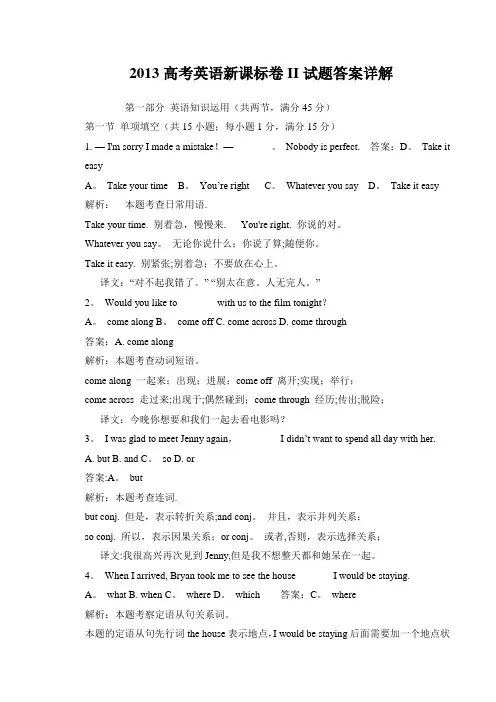
2013高考英语新课标卷II试题答案详解第一部分英语知识运用(共两节,满分45分)第一节单项填空(共15小题;每小题1分,满分15分)1. — I'm sorry I made a mistake!— ______ 。
Nobody is perfect. 答案:D。
Take it easyA。
Take your time B。
Y ou’re right C。
Whatever you say D。
Take it easy 解析:本题考查日常用语.Take your time. 别着急,慢慢来. You're right. 你说的对。
Whatever you say。
无论你说什么;你说了算;随便你。
Take it easy. 别紧张;别着急;不要放在心上。
译文:“对不起我错了。
” “别太在意。
人无完人。
”2。
Would you like to _______ with us to the film tonight?A。
come along B。
come off C. come across D. come through答案:A. come along解析:本题考查动词短语。
come along 一起来;出现;进展;come off 离开;实现;举行;come across 走过来;出现于;偶然碰到;come through 经历;传出;脱险;译文:今晚你想要和我们一起去看电影吗?3。
I was glad to meet Jenny again,_______ I didn’t want to spend all day with her. A. but B. and C。
so D. or答案:A。
but解析:本题考查连词.but conj. 但是,表示转折关系;and conj。
并且,表示并列关系;so conj. 所以,表示因果关系;or conj。
或者,否则,表示选择关系;译文:我很高兴再次见到Jenny,但是我不想整天都和她呆在一起。
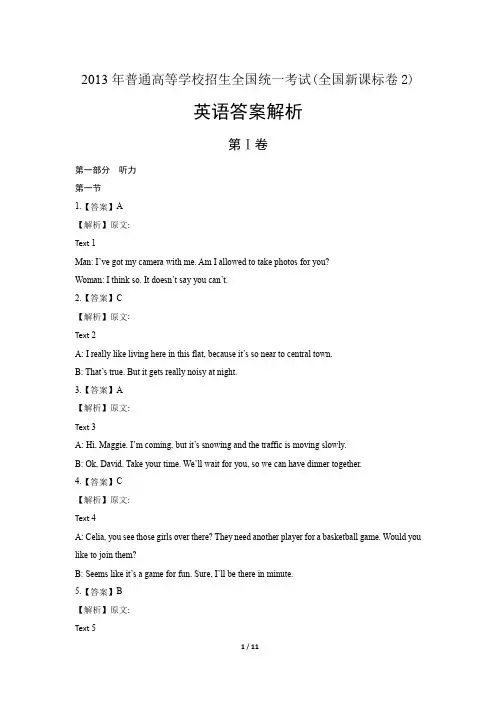
2013年普通高等学校招生全国统一考试(全国新课标卷2)英语答案解析第Ⅰ卷第一部分听力第一节1.【答案】A【解析】原文:Text 1Man: I’ve got my camera with me. Am I allowed to take photos for you?Woman: I think so. It doesn’t say you can’t.2.【答案】C【解析】原文:Text 2A: I really like living here in this flat, because it’s so near to central town.B: That’s true. But it gets really noisy at night.3.【答案】A【解析】原文:Text 3A: Hi, Maggie. I’m coming, but it’s snowing and the traffic is moving slowly.B: Ok, David. Take your time. We’ll wait for you, so we can have dinner together.4.【答案】C【解析】原文:Text 4A: Celia, you see those girls over there? They need another player for a basketball game. Would you like to join them?B: Seems like it’s a game for fun. Sure, I’ll be there in minute.5.【答案】B【解析】原文:Text 5A: I won’t have anything to wear to work on Monday unless I pick up my clothes at dry cleaner s’. B: Then you’d better hurry. It closes at noon on Sundays. A: Oh! I should have gone there on Saturday.第二节6.【答案】B7.【答案】B【解析】原文:Text 6A: Alright, Sara, we know that you are planning something big for John’s birthday. Could you tell us just what you have in your mind?B: I want to make his birthday a very special event. John has a sister living in France. And I’ll send her a plane ticket, so that she can be here for his birthday.A: Boy! What an excellent plan! That’s something special. I can’t guess some secret plans and we are waiting for the right time to tell him.B: Well, I didn’t want to s ay anything until I was sure she could come.8.【答案】A9.【答案】B【解析】原文:Text 7A: Hey, Peter, I’m sorry!B: Hi, Diana, what’s wrong?A: We were going to Hong Kong this weekend, but I’m afraid I can’t go.B: How come?A: I have a really big geography test and I have to study for it.B: We can go next week instead.A: No, I don’t want to ruin your weekend. You go ahead and please take the book I bought to my friend Sally. Tell her I have to study all weekend, because I can’t afford to fail the test.B: Ok, then I’ll go with them. But it’s a pity you can’t come.10.【答案】A11.【答案】B12.【答案】A【解析】原文:Text 8A: Hello, this is Andrea.B: Hello, Andrea, this is Alex. I have some very big news for you. Miranda was very satisfied with you and said she was very much looking forward to working with you. Isn’t that wonderful? Congratulations dear! How does it feel to be Miranda’s new assistant? How I imagine that you’ll just be delighted with this news. So let’s see, you can start on Monday, right?A: Umm, well, I don’t think I can start on Monday. I am visiting my father in Baltimore. And because I don’t live in New York, I’ll need a couple of days to find a flat and buy some furniture and move my things from Avon.B: Oh, well then, in that case I suppose Wednesday will be good. Ok, see you then!13.【答案】C14.【答案】A15.【答案】A16.【答案】B【解析】原文:Text 9Woman: Hello, Mr. Jan Erick Freedman. You’re a frequent traveler. And we also know that you eat out twice a day. How can you get so far and eating out.Man: When I my first job back in 1982 and started travelling. I had no other choice but eat out I found that I felt different due to what I was eating, so I tried to find places that served food that made me feel good. The secret was the quality of the food and how well the food was prepared. I made an effort to find out good restaurants as well as nice dishes.Woman: How did you manage to make a list of 218 favorite restaurants?Man: I’ve lived in cities and when I moved back to Sweden from the United States, people asked me where to go and eat and went to the cities I know. I got a lot of ideas. Then I wrote about restaurants for a Swedish club magazine and some suggested I gather information about restaurants together since I had all the facts about the restaurants I`ve been to. I started to do that. Woman: How do you find restaurants?Man: The best way is to ask the people there. I may talk to the people at the street market or take a walk and look for place for myself. I never asked hotel clerks or taxi drivers. I don’t go eitherrestaurants or places with menus too difficult to understand.17.【答案】C18.【答案】B19.【答案】C20.【答案】C【解析】原文:Text 10Man: At the beginning of the tour, we all started the most important place at my town which is the Plaza Leon. The Plaza Leon is more than 100 years old. It’s a gathering place for young people on Friday and Saturday nights, and for parents and children on Sunday afternoon. Four streets lead to the Plaza which have white sidewalks and tree lined. Hemandes Street which was named after writers born in the city contains all of the food stalls fish markets and vegetable stands. Femando Street which was named after a famous educator is where all of the government offices, shops and houses. Via del Mar Street which is the only street which has old stone surfaces. Finally we came to the Hewish’s Street on which there are two universities, one of which is the most f amous university in my country. That’s why it’s my favorite street of all.第二部分英语知识运用第一节单项填空21.【答案】D【解析】根据后句“人无完人”可知,前一个人犯错误了,应叫他take it easy(放松)。
2013年普通高等学校招生全国统一考试(课标全国卷Ⅱ)第一部分英语知识运用第一节单项填空1.D 句意:——对不起我犯错了!——别紧张。
没有人是完美的。
本题考查情景交际。
Take it easy别紧张(强调情绪);You re right你是对的;Whatever you say不管你说什么;Take your time别着急(侧重时间)。
2.A 句意:今晚你愿意和我们一起去看电影吗?本题考查动词词组辨析。
come along跟随;come off离开;come across(偶然)遇见;come through(重病后)康复。
3.A 句意:很高兴又见到Jenny了,但是我不想花一整天的时间和她在一起。
本题考查并列连词。
根据句意,前后分句之间存在转折关系,故应使用转折连词but;and表示递进和承接关系;so表示因果关系;or表示选择关系。
4.C 句意:当我到达时,Bryan带我去看了我将要住的房子。
本题考查定语从句。
先行词the house表示地点,还原到从句中为:I would be staying in the house.故应使用关系副词where引导定语从句。
5.D 句意:那天我比平时到办公室的时间要早,因为我赶上了7:30从Paddington来的火车。
本题考查非谓语动词作状语。
I是catch的逻辑主语,两者之间是主动关系,排除A项;动词不定式作状语,句子间通常不用逗号隔开,故排除B和C 项。
having caught是现在分词的完成式,表示该动作先于句子谓语动词动作发生,在此处作原因状语,符合语境。
6.B 句意:既然没人给予他任何帮助,他一定是独自完成这项研究的。
本题考查情态动词。
must have done表示对过去情况的肯定推测,意为“一定做了”,符合语境。
can表推测通常用于疑问句和否定句;would have done表示与过去事实相反的假设,通常用于虚拟语气中;need和have done连用时常用否定形式needn t have done“本没有必要做某事(而做了)”。
2013年考研英语二真题全文翻译答案超详解析2013 年全国硕士研究生入学统一考试英语(二)试题答案与解析Section I Use of English一、文章题材结构分析本文主要分析了无现金社会为何迟迟不来的原因。
第一段是文章的中心段落,指出真正的无现金社会很可能不会马上到来。
第二、三段从电子支付设备昂贵、纸质支票提供收据、使用纸质支票能获得浮存利息以及电子支付方式存在的安全隐私问题四个方面分析纸币系统得以继续存在的理由。
二、试题解析1.【答案】A (However)【解析】空前作者讲到“鉴于电子货币的优势,你也许会认为,我们将快速步入无现金社会,实现完全电子支付。
”而空后说“真正的无现金社会很可能不会马上到来”,两者之前出现了明显的转折关系,因此答案A。
B. moreover 表递进C.therefore 表结果D. Otherwise 表对比2.【答案】D (around)【解析】由空格所在句的“but”得知,句子前后是转折关系。
事实上,这样的预测已经二十年了,但迄今还没有实现。
A. off 停止; B. back 返回; C. over 结束,与后文均不构成转折,故答案选 D. around 出现。
3.【答案】B (concept)【解析】空格所在的句子意思为例如, 1975 年《商业周刊》预测电子支付手段不久将“彻底改变货币本身的____”将四个选项带入,能够彻底改变的对象只能是金钱的概念(定义),而A“力量”,C“历史”,D“角色”,语义都不恰当,并且如果选择role 的话,应该是复数roles, 因为是金钱的作用不止一个,故答案选B。
4.【答案】D (reverse)【解析】空格填入的动词跟前面的动词revolutionize (变革)意思上应该是同义替换的,要选择含有变革,彻底改变意思的词汇,四个选项中 A. reward 奖励 B. 抵抗 C. resume 重新开始,继续,都不合适,只有 D 选项reverse“颠覆”最为贴切,本句译为“电子支付方式不久将改变货币的定义,并将在数年后颠覆货币本身。
山东省2013年7月高等教育自学考试英语(二)试卷[14学分](课程代码:0015 考试时间:150分钟)本试卷分为两部分,第一部分为选择题,第二部分为非选择题;选择题50分,非选择题50分,满分100分;考试时间150分钟。
将全部答案写在答案纸的相应位置上,否则不计分。
PART ONE (50 POINTS)Ⅰ.Vocabulary and Structure (10 points, 1 point for each time)在每小题列出的四个备选项中只有一个是符合题目要求的,请将其选出并将答案代码涂黑。
错涂、多涂或未涂均无分。
1. The police offered ____for information about the stolen painting.A. a rewardB. an awardC. a profitD. a prize2. Please let me know if any difficulties ____.A. ariseB. haveC. comeD. happen3. John knows the rule but does not know how to ____ it.A. guideB. directC. applyD. manage4. Jack drew a ____ sun and a pale moon in the same picture.A. brightB. lightC. clearD. clean5. You may not like Thomas, but he has his ____.A. meritsB. goodC. advantagesD. feelings6. It is ____ that no one feels like working.A. a so cold dayB. such a cold dayC. such cold a dayD. a such cold day7. The boy is quite well now, ____ a slight headache.A. besidesB. exceptC. besideD. except for8. If the United States had built more homes for poor people in 1955, the housing problems now in some parts of the country____ so serious.A. wouldn’t beB. wouldn’t have beenC. will not beD. would have not been9. John didn’t know the way to the station, so he stopped ____.A. to askB. askingC. for askingD. to asking10. It was not until he arrived at the station _____ he realized he had forgotten his ticket.A. thereB. thatC. thenD. whereⅡ.Cloze Test (10 points, 1 point for each item)下面短文中有十个空白,每个空白有四个选项。
中央广播电视大学2012-2013学年度第二学期开放专科期末考试英语I(2)试题2013年7月第一部交际用语1---Has Peter finished his work?----Yes.He finished a long time ago.A rightB wrong2 ---Can I smoke in the office?---No,you are not allowed to smoke here.A rightB wrong3---They live in London,don’t they?---Yes.They’ve been there for five years.A rightB wrong4 ---Who is the man Jane wants to marry?---Yes.Jane wants to get married.A rightB wrong5 ---Do you like coffee?---I prefer to have tea.A rightB wrong第二部分词汇与结构6 She’s not tall____to play basketball.A veryB tooC enough7 My brother likes to___chess in his free time.A doB playC go8 The girl is deaf.She can’t hear____.A something b anything C nothing9 It’s____to learn how to play tennis.A easilyB easyC lazy10 He stopped ____TV when dinner was ready.A watchingB to watchC watch11 My sister told me_____his trip to Scotland.A aboutB withC on12 You ordered fish,_____?A don’t you b didn’t you C haven’t you13 Mary is not interested____keeping accounts.A inB atC for14 these people are building a bridge____the river.A throughB acrossC in15 She had her finger____when she was preparing supper.A cuttingB to cutC cut16 He used to____very hard when he was young.A workingB to workC work17 ____they landed,they went to the conference.A Until b When C After18 As a news reporter,James___many places inthe world.A has gone to b has been to C went to19 My uncle____lives in America is visiting us next week.A whom mB whichC who20 I went to his house but couldn’t get in.there was___there.A no one b nothing C someone21 If you___the tickets,I will do the packing.A will book b booked c book22 He____me he was going to Japan next month.A saidB toldC tell23 This photo____be of beijing.there’s the great Wall.A can’tB must c could24 I have to go now.I have to pick___my son from school.A up b in c with25 Mr Hilton is not good at dancing.Neither___his children.A isB areC be第三部分句型变换26They smashed the window.(改为被动语态)27 Jack is responsible for all the training.(用what针对划线部分提问)28 She sold the radio.the radio was in her bedroom.(用that将两个句子连接起来) 29”I heard a noise in my living room”,he said.(将句子改为间接引语)30Although it rained,she liked the trip.(用in spite of将两句连成一句)第四部分阅读理解Mary has just returned to the USA after studying in England for three years.She decided to study at a British university rather than an American one because her mother is from England and she wanted to get to know her mother’s family better.She studied English Literature at Golssmiths’College,which is in London.she lived with her grandmother while she was studying.the college was recommended by a friend’s brother who had studied in England for his MBA.Mary told her friends that she was going to return to Europe to work because she had enjoyed her time in England so much.31 Mary is now in_________.A London b England C the USA32 She studied at________university.A an AmericanB a BritishC a Chinese33 Most probably,her grandmother____.A was a teacher in the coolege b studied English Literature C lived in London34 Her friend’s brother recmoommended her to____.A study for her MBAB study in the college Cwork for his comany35 Mary would return to Europe to____.A workB spend her holidayC study36-40题In Europe sales of new motorcycles have increased by 12 percent this year.This is probably because more and more people are using them to travel to work in cities shere the roads have too many cars using them.Most of these motorcycles areimported from Japan,but many are built in Europe.Italy is the largest producer of motorcycles in Europe.Most custermers are buying small mototcycles because they have not ridden before,and these motorcycles are best for people who want to learn how to ride.Britain and germany only produce large motorcycled,but both these countried have also seen sales of their products rise.More people are also watching motorcycle sports on television.This is because of more television programmes about motorcycle racing,and also because of new yoong riders whe are like pop stars and have lots of fans.Many governments think that an increase in the number of motorcycles on the roads is a good thing,and are palling new laws to help motorcyclists.this is because they think than motorcycles are better than cars on busy city streets and also produce less pollution.Because motorcycles can be mor dangerous than cars,riders have to wear helmets in most European conutries.36 Sales of new motorcycles have increased in Europe.A RightB Wrong37 Many of the new motorcycles sold in Europe are produced in Etaly.A RightB Wrong38 Sales of large motorcycles have also increased.A RightB Wrong39 Young motorcyclists like pop stars very much.A RightB Wrong40 In Europe you have to wear a helmet when you ride a motorcycle.A RightB Wrong第五部分41-45题英译汉41 It would be great to see you to catch yp on all our news.42 Do you take after your mother or father?43 Whe have enough money to improve the websits.44 One of the biggest sporting enents in the world is the Olympic games.45 I have to move out of my room on Friday because Franco has got another tenant.。
试卷代号:1161中央广播电视大学2012—2013学年度第二学期“开放本科”期末考试英语Ⅱ(1)试题2013年7月注意事项一、将你的学号、姓名及分校(工作站)名称填写在答题纸的规定栏内。
考试结束后,把试卷和答题纸放在桌上。
试卷和答题纸均不得带出考场。
二、仔细阅读题目的说明,并按题目要求答题。
答案一定要写在答题纸指定的位置上,写在试卷上的答案无效。
三、用蓝、黑圆珠笔或钢笔答题,使用铅笔答题无效。
第一部分交际用语(共计10分,每小题2分)1—5小题:阅读下面的小对话,从A、B、C三个选项中选出一个能填入空白处的最佳选项,并在答题纸上写出所选的字母符号。
1.——Hello,may I talk to the headmaster now?——————————————A.sorry,he is busy at the momentB.No,you can’tC.Sorry,you can’t2.一Would you like to have dinner with US this evening?——————————————A.OK,but I have to go to a meeting nowB.No,I can’tC.Sorry'but this evening I have to go to the airport to meet my parents3.一Oh,sorry to bother you.——————————————A.That’s okeyB.No,you can’tC.That’s good4.Can you turn down the radio , please?——————————————A.Oh,I knowB.I’m sorry,I didn’t realize it was that loud。
C.I’11 keep it down next time5.——What’S the problem,Harry?——————————————A.No problemB·I can’t remember where I left my glassesC.No trouble at all第二部分词汇与结构(20分,每小题2分)6—15小题:阅读下面的句子,从A、B、C三个选项中选出一个能填入空白处的最佳选项,并在答题纸上写出所选的字母符号。